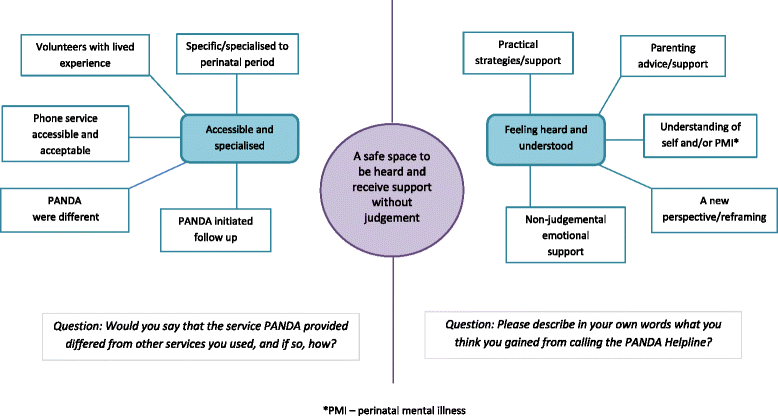Exploring the views and experiences of callers to the PANDA Post and Antenatal Depression Association Australian National Perinatal Depression Helpline: a cross-sectional survey
- PMID: 26347275
- PMCID: PMC4562185
- DOI: 10.1186/s12884-015-0594-0
Exploring the views and experiences of callers to the PANDA Post and Antenatal Depression Association Australian National Perinatal Depression Helpline: a cross-sectional survey
Abstract
Background: Anxiety and depression are common in the perinatal period. Telephone interventions, including telephone peer support and counselling, have been developed to support those experiencing perinatal mental illness. PANDA Post and Antenatal Depression Association provides support to women and men experiencing perinatal mental illness via the Australian National Perinatal Depression Helpline, encompassing both volunteer peer support and professional counselling. This study aimed to explore the experiences of callers to the Helpline.
Methods: A cross-sectional survey design was used. All new callers from 1(st) May to 30(th) September 2013 were invited to participate. The survey, adapted from a previous survey of PANDA callers, included 23 questions using Likert-type scales, demographic and open-ended questions. Thematic network analysis was undertaken for responses to open-ended questions.
Results: 124 responses were received (124/405; 30% response). The majority of callers had called the Helpline regarding themselves (90%), with over one third (33%) of all callers seeking crisis support and help. Ninety-nine per cent of respondents 'agreed' or 'strongly agreed' that staff and/or volunteers understood their concerns, and 97% 'agreed' or 'strongly agreed' that overall PANDA had helped them. Callers described the PANDA service as uniquely tailored to the perinatal period, providing accessible, non-judgemental understanding and support, with a global theme from open-ended comments describing PANDA as 'a safe space to be heard and receive support without judgement'. Recommendations for service changes included increased hours of availability.
Conclusions: Callers reported positive experiences of accessing support from the PANDA National Perinatal Depression Helpline. The Helpline was described as an accessible and acceptable telephone support for individuals experiencing perinatal mental illness. Recommendations for changes to the service included an increase in hours of operation to enable greater responsiveness at times of need, reduced waiting times, and access to continuity with the same volunteer and/or telephone counsellor. The findings of the study will be useful in informing future service provision, review, and implementation.
Figures
Similar articles
-
Peer supporters' experiences on an Australian perinatal mental health helpline.Health Promot Int. 2019 Jun 1;34(3):479-489. doi: 10.1093/heapro/dax097. Health Promot Int. 2019. PMID: 29346557
-
'I need help': Reasons new and re-engaging callers contact the PANDA-Perinatal Anxiety and Depression Australia National Helpline.Health Soc Care Community. 2019 May;27(3):717-728. doi: 10.1111/hsc.12688. Epub 2018 Dec 3. Health Soc Care Community. 2019. PMID: 30511356
-
Characteristics of women calling the PANDA Perinatal Anxiety & Depression Australia National Helpline: a cross-sectional study.Arch Womens Ment Health. 2018 Dec;21(6):801-812. doi: 10.1007/s00737-018-0868-4. Epub 2018 Jun 8. Arch Womens Ment Health. 2018. PMID: 29948297
-
Digital Tools in the Service of Peer and Social Support for Perinatal Mental Health.Curr Psychiatry Rep. 2023 Nov;25(11):741-746. doi: 10.1007/s11920-023-01464-2. Epub 2023 Oct 2. Curr Psychiatry Rep. 2023. PMID: 37782453 Review.
-
Systematic Review: The State of Research Into Youth Helplines.J Am Acad Child Adolesc Psychiatry. 2021 Oct;60(10):1190-1233. doi: 10.1016/j.jaac.2020.12.028. Epub 2020 Dec 28. J Am Acad Child Adolesc Psychiatry. 2021. PMID: 33383161
Cited by
-
Telephone health services in the field of rare diseases: a qualitative interview study examining the needs of patients, relatives, and health care professionals in Germany.BMC Health Serv Res. 2018 Feb 9;18(1):99. doi: 10.1186/s12913-018-2872-9. BMC Health Serv Res. 2018. PMID: 29426339 Free PMC article.
-
Autistic Women's Experience of Motherhood: A Qualitative Analysis of Reddit.J Autism Dev Disord. 2025 Jul;55(7):2539-2549. doi: 10.1007/s10803-024-06312-7. Epub 2024 Apr 26. J Autism Dev Disord. 2025. PMID: 38668893 Free PMC article.
-
First-time mothers' perceptions of social support: Recommendations for best practice.Health Psychol Open. 2020 Feb 7;7(1):2055102919898611. doi: 10.1177/2055102919898611. eCollection 2020 Jan-Jun. Health Psychol Open. 2020. PMID: 32095254 Free PMC article.
-
Satisfaction and Mental Health Outcomes Associated with a Large Regional Helpline.Community Ment Health J. 2022 Aug;58(6):1214-1224. doi: 10.1007/s10597-021-00931-5. Epub 2022 Jan 11. Community Ment Health J. 2022. PMID: 35015179 Free PMC article.
-
Demographics and Use of an Addiction Helpline for Concerned Significant Others: Observational Study.J Med Internet Res. 2025 Apr 14;27:e55621. doi: 10.2196/55621. J Med Internet Res. 2025. PMID: 40228240 Free PMC article.
References
-
- Johnson S, Bonello M, Li Z, Hilder L, Sullivan E. Maternal Deaths in Australia 2006–2010, Maternal Deaths Series No. 4 Cat. No. PER 61. Canberra: AIHW; 2014.
-
- Astbury J, Brown S, Lumley J, Small R. Birth events, birth experiences and social differences in postnatal depression. Aust J Public Heal. 1994;176. - PubMed
Publication types
MeSH terms
LinkOut - more resources
Full Text Sources
Other Literature Sources
Medical




